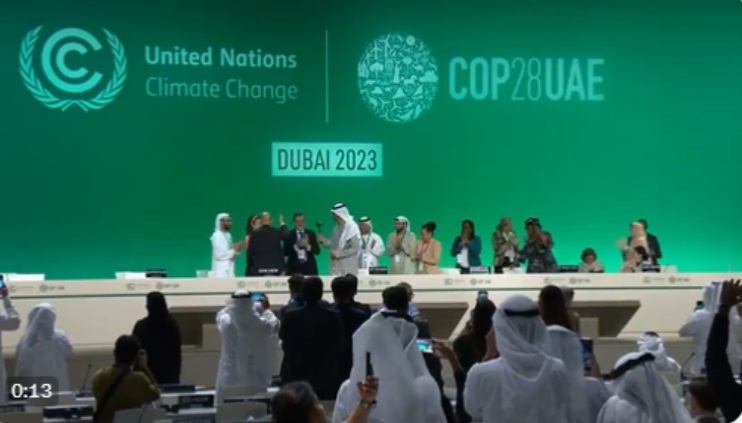Robert Lyman: Just the Facts
Mr. Lyman’s summary of the COP’s outcome lists eight “calls on the parties” to voluntarily do things like tripling renewable energy capacity by 2030 (previously agreed to by the US, China and the G20 countries), phasing down unabated coal power, accelerating efforts towards net-zero energy systems by mid-century, transitioning away from (instead of phasing down or out) fossil fuels, reducing methane emissions, accelerating emissions reductions from transport, and phasing out “inefficient” fossil fuel subsidies.
Mr. Lyman also focuses on various financial promises to the developing world. The main one was agreement to “operationalize” the Loss and Damages Fund that was approved in principle at COP27. However, instead of the hoped-for hundreds of billions, pledges to the LDF at COP28 amounted to only $400 million, of which the US promised $17.5 million and Canada $11.8 million. There was no agreement on which countries should pay (and how much) and which ones qualify to receive LDF payments. Para 68 of the COP28 decision document states that developing countries need $215-387 billion/year in adaptation finance to 2030. But, given that para 80 of the decision document notes “with deep regret” the failure of developed countries to jointly mobilize even $100 billion/year (first promised at COP15 in Copenhagen) in 2021, the prospects of getting the sums envisioned for the LDF are dim.
COP29 will take place in Azerbaijan (another petrostate) November 11-22, 2024 and COP30 will be held in Brazil (gearing up to become the world’s fourth largest oil producer) November 10-21, 2025.
One Guardian story supports Dr. Peiser’s observation about climate science taking a back seat at COP28. It quotes Michael Mann, who calls the lack of agreement to phase out fossil fuels “devastating.” Rather than ending the COP process, Dr. Mann wants to reform the rules by allowing super majorities to overcome objections by petrostates and barring oil executives from presiding over future summits. The story includes disapproving comments from a Nature editorial (“the science is clear”), a former UK chief scientific advisor, a climatologist at Imperial College London, as well as scientists from the University of Exeter, Lancaster University, and Bournemouth University.
In a “So what now?” editorial The Guardian sees an existential fight between the fossil fuel industry and the rest of civilization – and only one can prosper. Since the industry can’t reform itself, the newspaper proposes to end its “hegemony over the planet’s life support systems” by regulations like carbon border taxes; blocking imports of gas produced with excessive methane leaks; forming climate clubs of nations acting together; taxation of fossil fuels, international aviation and shipping; and ending fossil fuel subsidies. Given the locations for the next two COPs, the petroleum industry’s presence at climate summits will continue, though it’s unlikely that either host country will have the chief executive of its national oil company preside over the summit.
Ian Cameron
Director, Friends of Science
friendsofscience.org
Mr. Lyman also focuses on various financial promises to the developing world. The main one was agreement to “operationalize” the Loss and Damages Fund that was approved in principle at COP27. However, instead of the hoped-for hundreds of billions, pledges to the LDF at COP28 amounted to only $400 million, of which the US promised $17.5 million and Canada $11.8 million. There was no agreement on which countries should pay (and how much) and which ones qualify to receive LDF payments. Para 68 of the COP28 decision document states that developing countries need $215-387 billion/year in adaptation finance to 2030. But, given that para 80 of the decision document notes “with deep regret” the failure of developed countries to jointly mobilize even $100 billion/year (first promised at COP15 in Copenhagen) in 2021, the prospects of getting the sums envisioned for the LDF are dim.
COP29 will take place in Azerbaijan (another petrostate) November 11-22, 2024 and COP30 will be held in Brazil (gearing up to become the world’s fourth largest oil producer) November 10-21, 2025.
The Guardian: Failure on Fossil-fuel Phase Out and “So What Now?”
One Guardian story supports Dr. Peiser’s observation about climate science taking a back seat at COP28. It quotes Michael Mann, who calls the lack of agreement to phase out fossil fuels “devastating.” Rather than ending the COP process, Dr. Mann wants to reform the rules by allowing super majorities to overcome objections by petrostates and barring oil executives from presiding over future summits. The story includes disapproving comments from a Nature editorial (“the science is clear”), a former UK chief scientific advisor, a climatologist at Imperial College London, as well as scientists from the University of Exeter, Lancaster University, and Bournemouth University.
In a “So what now?” editorial The Guardian sees an existential fight between the fossil fuel industry and the rest of civilization – and only one can prosper. Since the industry can’t reform itself, the newspaper proposes to end its “hegemony over the planet’s life support systems” by regulations like carbon border taxes; blocking imports of gas produced with excessive methane leaks; forming climate clubs of nations acting together; taxation of fossil fuels, international aviation and shipping; and ending fossil fuel subsidies. Given the locations for the next two COPs, the petroleum industry’s presence at climate summits will continue, though it’s unlikely that either host country will have the chief executive of its national oil company preside over the summit.
Ian Cameron
Director, Friends of Science
friendsofscience.org

Click to close
